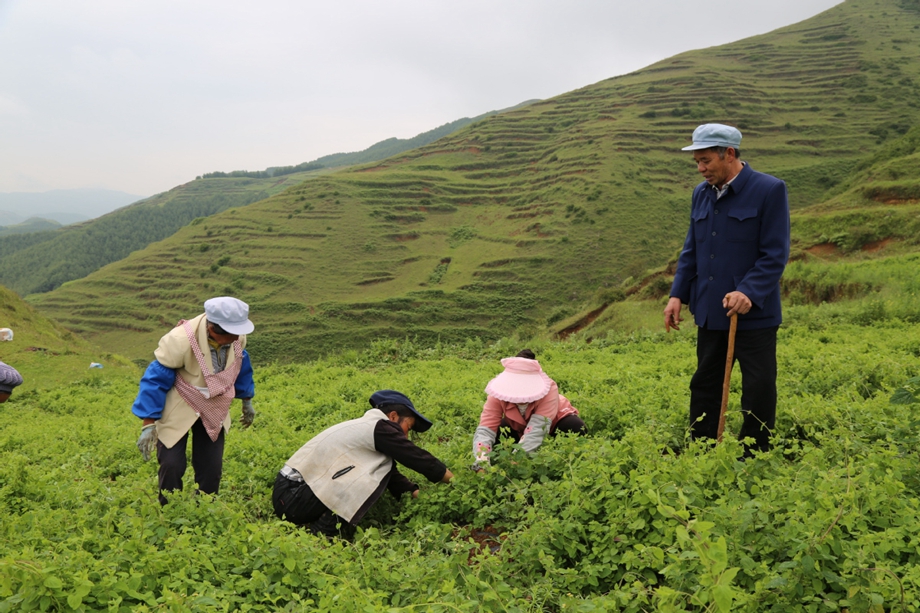Businessman ends architectural career to devote himself to poverty alleviation

Tan Decai (right) plants dangshen with fellow villagers in Ganshan village, Yunnan province. CHINA DAILY
Whether as village chief or head of a specialized farm cooperative, 68-year-old Tan Decai has devoted himself to helping villagers in Yunnan province overcome poverty.
In 2000, when Ganshan village in Yongshan county, northeast Yunnan, started rural reform, a dozen villagers came to his home and asked him to be village chief and help lead them out of poverty.
Tan was in the architecture business and had an annual income of around 40,000 yuan ($4,830 at the time). The annual salary for a village chief was a fraction of that, at only 3,540 yuan.
"I was so busy with business then, and if I had said yes to the village chief position, I'd have had to quit my business," Tan recalled.
After chewing the idea over for a few days, Tan left his company and became village chief. He promoted new methods and technology for growing corn and potatoes and within two years, villagers were able to feed and clothe themselves adequately.
To help bring in more income, Tan held a meeting and decided to open a sand factory.
According to former deputy village chief, Li Shijun, Ganshan had no money for a factory, so Tan took out a loan of 30,000 yuan to buy the machinery.
He said that after Tan was named chief, he took the members of the village committee on a tour to visit all the villagers and would walk from hill to hill, wearing out a pair of shoes every seven to eight days.
After thorough research and surveying, Tan decided that half the village should focus on animal husbandry, and the other half on planting traditional Chinese medicines and providing labor services.
He also encouraged the villagers to return farmland to forest, and by 2003, over 265 hectares of new forest had been created.
On Oct 15, 2003, Tan had an accident while riding a motorcycle to work, fracturing his left thigh and calf in five places and leaving him with a permanent disability.
Six months later, he left hospital and continued to work from home.
After a visit to Gansu province, he decided to bring dangshen, a Chinese medicinal herb also known as Codonopsis pilosula, or bellflower, to Ganshan, and helped found a traditional Chinese medicine cooperative.
In 2014, the village planted over 40 hectares of the herb, with each hectare bringing in about 45,000 yuan.
In 2015, they expanded to plant around 76 hectares.
According to Zhou Min, one of the villagers, during peak season, the cooperative employs 108 people, and in 2015 it paid over 1 million yuan in salaries.
The cooperative also built a farm that can raise around 1,000 wujin pigs, which feed on the branches and leaves of the bellflower.
In addition, the cooperative invited villagers to become shareholders, including 24 families with disabled family members.
Tai Youzhong was one of them. "Even though I'm a disabled person, I don't want to live my life relying on the government. I want to be like Tan, and plant dangshen with him, and find the value and happiness of life," he said.
Liu Xingde, then county Party chief, said that by deciding to cultivate dangshen, Ganshan has developed a new path for poverty alleviation in the cold highlands.
Tan believes it's a Party member's duty to face difficulties, and the primary Party obligation is the battle to alleviate poverty.
He was elected as a deputy to the National People's Congress in January 2018, and nine months later, he was honored with the National Award for Poverty Alleviation.
Tan was excited and proud to win the award. "The achievement does not belong to me, it's the result of the hard work of all cadres and the masses in Yongshan," he said.
"Next, inspired by this award, I want to work with more confidence and enthusiasm and make my contribution to consolidate the results of poverty alleviation and comprehensively promote rural vitalization."